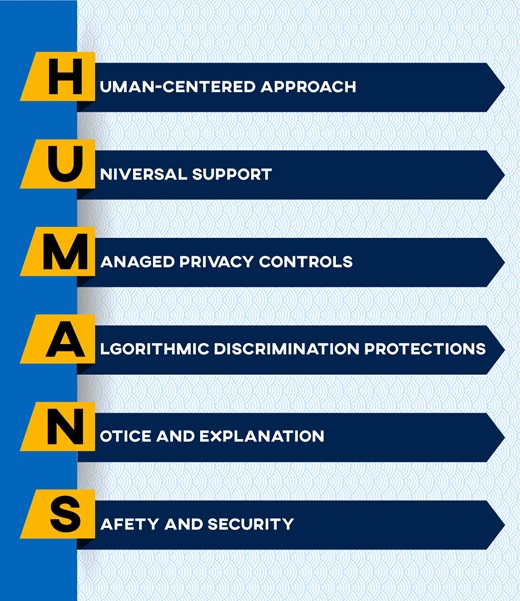Human-Centered Principles for Adopting Generative AI
Generative artificial intelligence (GenAI) and Artificial intelligence (AI) present transformative opportunities for students, faculty, administrators and staff that could propel the California Community Colleges to the forefront of achievement for the future of learning in higher education.
From language translation to honing critical thinking to increasing engagement through tailored content and personalization, AI is helping students achieve key learning outcomes while developing skills increasingly sought in the workforce. AI systems can serve as capacity-extenders, allowing faculty, administrators and staff to reduce time spent on repetitive tasks and freeing them to focus on strategic planning and improving the delivery of services across the California Community Colleges.
Generative AI is a unique and potentially transformative technology that is spreading across all manner of industries and disciplines. The growing adoption and use of AI is transforming the future of learning and the future of work itself. We must not only respond to its opportunities and challenges but provide leadership and guidance to our students, faculty, staff, and communities on how to appropriately integrate and leverage these new capabilities.
Generative AI is called out in the Vision 2030 as one of the three key strategic directions and more information is available on the AI Professional Development and Learning Opportunities web page. The California Community Colleges are committed to using AI to:
- Support the teaching and learning process
- Improve communication with students
- Improve student engagement and retention
- Improve operational and administrative efficiency
- Advance equitable support, access and success
The HUMANS Framework and Guiding Principles
A HUMANS-centered approach to adopting and using AI and GenAI will allow us to guard against the negative and undesirable aspects of the technology while building out and supporting the positive uses that improve equitable student support, access, success and operational efficiencies.
- Human-Centered approach — Include humans in the design and testing process to achieve successful outcomes and ensure students, faculty, administrators and staff have equitable access to tools, training and solutions that minimize bias and improve outcomes.
- Universal Support — Provide students, faculty, administrators and staff the option to opt out, where appropriate. Provide reliable access to a human qualified to quickly address and remedy problems.
- Managed Privacy Controls — Give students, faculty, administrators and staff agency over how their personal data is collected and used. Set parameters that shield from abusive data practices via built-in protections and ensure only necessary student data is collected for the sole purpose of increasing access and support.
- Algorithmic Discrimination Protections — Ensure algorithms and systems are designed in an equitable way and free of discrimination. Take appropriate and swift action to remedy tools found to be discriminatory.
- Notice and Explanation — Provide sufficient notification to students, faculty, administrators and staff about the use of an automated system, how it impacts them and how it contributes to outcomes.
- Safety and Security — Protect students, faculty, administrators and staff from unsafe or ineffective systems.

The framework establishes a strong foundation for deploying AI and Generative AI technology in education, emphasizing the following:
- Ethical considerations
- Student well-being
- Privacy protection
- Fairness
- Transparency
- Accountability
By adhering to these guiding principles, the California Community Colleges can ensure AI technology enhances learning experiences and enables student success while prioritizing the rights and safety of students and those supporting them.
Fundamental Values
Our fundamental values assess the appropriateness of Ai and GenAI and speak to the impact of the technology on faculty, staff and administrators.
- Provide robust professional development and support for educators and administrators in understanding and integrating AI into educational and operational practices.
- Evaluate the impact of AI and GenAI on faculty and staff positions and develop professional development plans to enable employees to elevate and shift their work to higher-level tasks requiring a person.
- Educate stakeholders on the unique aspects and implications of Generative AI compared to other types of AI.
- Address societal biases and promote equity in AI inputs, outputs, and products.
- Foster public-private partnerships to ensure equitable access to AI tools, training and resources.
- Integrate under-resourced districts and colleges into core decision making, pilot testing, and implementation to close rather than widen the digital divide.
- Establish guidelines and standards for the ethical and responsible use of AI in educational contexts.
- Encourage ongoing research and evaluation to understand the impacts of AI on education and workforce dynamics.
- Provide media and information-literacy training and professional development opportunities that enable students, faculty, staff and administrators to evaluate and assess materials developed by AI and GenAI.
-
AI Fellows Program
The Digital Center is launching the AI Fellows Program—an exciting opportunity for five leaders to shape the future of AI across California’s community colleges. -
Digital Center for Innovation, Transformation and Equity
The Digital Center for Innovation, Transformation and Equity ("Digital Center") represents a strategic approach to supporting Vision 2030 for the California Community Colleges. -
AI Professional Development and Learning Opportunities
There are many new AI resources and professional development opportunities available to the system.
Resources
Generative AI and the Future of Teaching and Learning Report to Board of Governors (PDF)
Generative AI Appendix A: Potential Foundational Learning Topics in AI (PDF)
Academic Integrity in the Era of Artificial Intelligence (PDF)
Offered and curated by the ASCCC Educational Policies Committee

